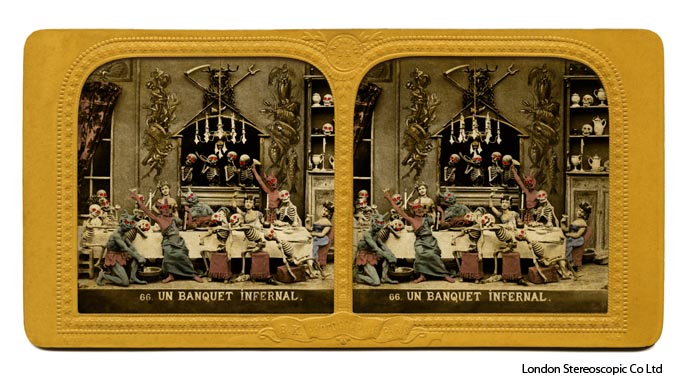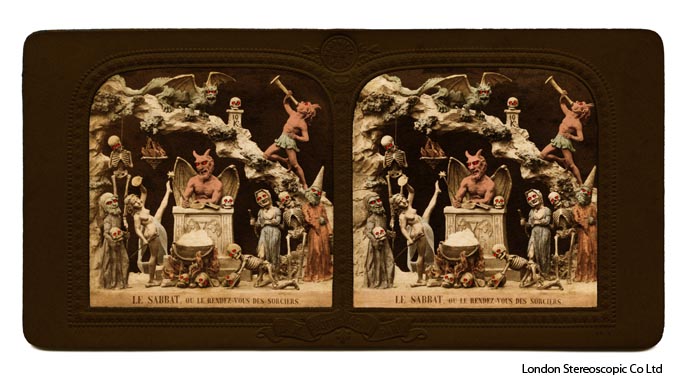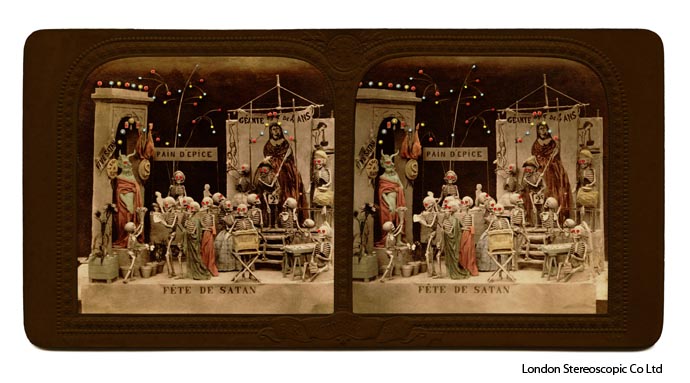THE HUFFINGTON POST
22 October by Mallika Rao
Think of them as the holograms of the nineteenth century — stereoscopic photographs, pairs of flat images that appear three-dimensional when seen through a special lens.
A book out this month, “Diableries: Stereoscopic Adventures In Hell,” sheds light on this once-popular form of entertainment. The Diableries were a famous series of stereoscopic images set in the underworld, made by artists living under Napoleon’s reign in the 1860s. Their target: the vices of the French upper class. Skeletons, playing analog to aristocrats, carouse with jovial devils. The alcohol flows. The scenes, originally sculpted in clay, feature glowing red eyes (rendered by backlit dabs of paint).

The book’s top-billed author is also larger than life. Brian May, who holds a Ph.D. in physics, is a founding member of the British rock band Queen. The guitarist has long been rock’s resident polymath. For this book, he and his co-authors tracked down all but two of the original Diableries. May also designed the viewing tool included in its packaging.
In the U.S. for the launch of the Queen musical, “We Will Rock You,” May stopped to chat with HuffPost about his odd new book
. You’ve collected stereoscopic photographs for decades. What is it that you find so compelling about these images? It’s just inherently thrilling to me because we’re all so used to flat images, from posters to magazines. As depictions, those are very imperfect. As soon as I discovered as a kid that you can put two of these flat images together in a viewing apparatus, and you get a 3D image, that felt surreal. And you can touch it! That’s such a huge magic that never left me.
In their time, plenty of people must have thought of them as magic.
This tradition goes back to about 1850. We’re talking about a time when photography was very young itself. It was just starting to compete with painting, and at the same time stereoscopy was developing too — in England and France and America. The world was full of stereoscopic pictures, cards depicting everything from people building the pyramids to Chinese farmers brewing tea. It was the cinema of its day.
And now cinema has gone 3D. We’re having a bit of a renaissance at the moment. Ever since Avatar, I don’t have to explain what 3D is. I’m a big fan, but [at the theater] your brain is always slightly fighting to reject the stuff it doesn’t want to see. That’s the imperfection of the glasses.
What we’re looking at in the Diableries though is true Victorian stereoscopic. There is a perfection of them in excess of what you can do in the cinema. Your brain isn’t asked to do anything it can’t do at the scene. You have perfect separation of the left and the right images. You look through the window and you’re there — in this case, in the world of skeletons and devils in a parallel universe called enfer, which is hell. The funny thing is, it’s a fun place to be.

Do you imagine they could catch on again? Not to the same degree, I’d think. It’s essentially a parlor kind of activity, which you share in your living room. It’s very personal, very non-digital, very analog, very traditional. It’s a one to one thing. If you’re with a person in your home you can share a stereoscopic viewer. It’s a social thing as well, which we’ve lost.
You’ve nursed a serious hobby of collecting these images since your early days with Queen. Did this book surprise any of your band members, or were they all waiting for it to materialize? Oh yeah, the whole band was aware of my obsession. Any spare moment, I was looking for the photographs. Freddie [Mercury] would have loved the book, I think. He loved photography. When the Polaroid camera was invented, he was just enchanted. He carried it everywhere. He’d take pictures of his friends and give them away. He was very generous. He probably ended up with none of them.

It sounds like he was practicing the principles of Instagram before his time. Yes, he would have loved it. It’s so strange — Freddie hasn’t been around since the Internet has been. In 1991, mobile phones didn’t exist. The world has changed vastly in the 20 years we haven’t been with him. Twenty years with him, 20 without. It’s a curious life for me.
Are you planning to write any more books? Me and my great writing partner, Denis [Pellerin], are writing a book on the guitar. I made my guitar with my dad. It has a whole story of its own. It’s been all around the world with me. I played with it on top of the Buckingham Palace roof, at the closing ceremony of the Olympics. It’s totally a homemade guitar. The book will be called “The Red Special” — that’s the working title.
And I probably need to write a book about Queen.
I’m sure people would love that. Although it sounds like you may not have the time! It’s hard. The things I do are things I dreamed about when I was a kid — it’s hard to give any of them up. I certainly can never get bored. I get tired though. There isn’t much opportunity to sleep.
“Diableries: Stereoscopic Adventures In Hell” is available at Amazon.